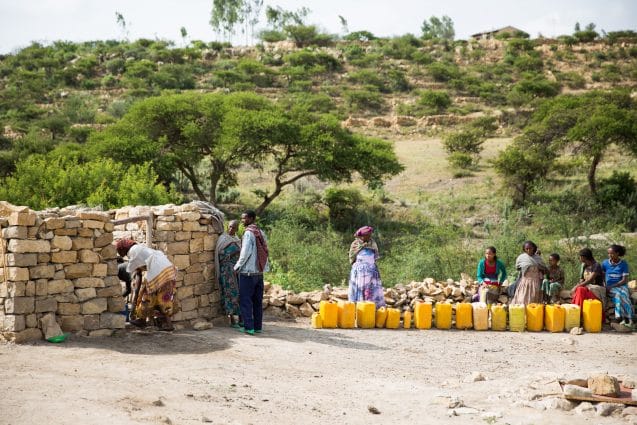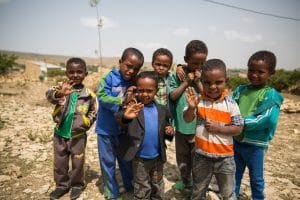Copyright © 2026 UNICEF HUNGARY
Ismerje meg, hogy adományával kiknek segítettünk már
2016. július 28. 15:38
A Turkana-tó egy sósvíz magas fluorid tartalommal, így a víz nem alkalmas fogyasztásra. De mivel nincs más alternatíva, a lakók rá vannak kényszerítve, hogy a túlélés érdekében ezt a vizet igyák.
A Területi Népegészségügyi tiszt, Innocent Sifuna szerint a tóvizének folyamatos használata végtag deformitásokat okoz a víz magas só és fluorid tartalma miatt. A területen a kolerás esetek száma is magas, a járványok főleg a gyerekeket sújtják. „ A kutatások azt mutatják, hogy ezeket a Turana-tó vize okozza.” – mondta Mr. Sifuna.
A tiszta víz hiánya mellett a megfelelő egészségügyi és higiéniai létesítmények és gyakorlatok hiánya is komoly kihívást jelent. A hasmenéses megbetegedések is gyakoriak, és a visszatérő járványok nagyban hozzájárulnak a magas gyerekhalandósági rátához Turkana-ban.
Jacinta Asinyen, hat gyermek édesanyja kosarakat fon és árul, hogy megéljenek. Jacinta három gyermekének is deformáltak a végtagjai, köztük a legkisebbnek, Sundaynek.
![On 3 August, Montegbosh carries her 18-month-old son, Zerihun, as she collects water from a creek in Odoleka Village, Oromia Region. Drought and failed crops have left Montegboshs family hungry. Although she is able to feed Zerihun breastmilk, she eats only false banana, a starchy root vegetable. Her four-year-old son is not getting enough nutritious food, and the family does not have enough money to purchase milk. To make matters worse, the village pump broke several days ago. Villagers are now forced to use muddy water from the nearby creek for drinking and cooking. [#3 IN SEQUENCE OF THREE] In late August 2011, the crisis in the Horn of Africa affecting primarily Kenya, Somalia, Ethiopia and Djibouti continued, with a worsening drought, rising food prices and ongoing conflict in Somalia. The regions worst drought in 60 years has left 12.4 million people in need of assistance, including 4.8 million in Ethiopia. The Government of Ethiopia estimates that 150,000 children under age five will require treatment for severe acute malnutrition, a deadly condition, by the years end. In addition, over 76,000 refugees from Somalia which faces one of the worlds severest food security crises have entered Ethiopia, with a further 200 to 300 arriving every week. Many refugees are dangerously malnourished, and death rates among refugee children have reached alarming levels, according to the United Nations High Commissioner for Refugees (UNHCR). Meanwhile, emergency food reserves are dwindling, and outbreaks of measles have been reported in refugee camps. UNICEF, together with the Government, United Nations, NGO and community partners, is supporting a range of interventions and essential services, especially for the displaced and for refugees, including feeding programmes, immunization campaigns, health outreach, and access to safe water and to improved sanitation. A joint United Nations appeal for humanitarian assistance for the region r](https://unicef.hu/wp-content/uploads/2016/07/UNI115607-300x200.jpg)
Ezt a sós vizet használtam főzni és inni, mondta, és észrevettem, hogy a gyerekeim betegesek, és problémák vannak a csontjaikkal.
Az UNICEF a kenyai Vöröskereszttel és a kenyai kormánnyal karöltve a Turkana régió vízproblémáinak megoldásával küzd. A víz, egészségügy és higiénia program (WASH) elindult és a cél, hogy 7600 lakónak biztosítsák a tiszta vízhez való hozzájutást. A program költsége 253.730 dollár (közel 70 millió Ft).
Az, hogy ekkora összeget tudtak a falvak vízellátásának fejlesztésére fordítani, az UNICEF mindezt az adományozóinak köszönheti. Az Ön adománya is hozzájárul ahhoz, hogy annak a 7600 embernek a közeljövőben ne kelljen a víz okozta egészségügyi problémák miatt aggódnia.
A program része, hogy természetes, biztonságos és megbízható földalatti forrásokat találjanak, és további szűrés után tiszta vizet biztosítsanak a közösségnek. Egy környezetbarát napenergiával működőd pumpa segítségével hozzák a vizet a felszínre egy víztározóba, majd egy 26 km-es csőrendszer segítségével juttatják el a falvakba. A víz további szűrésére víztisztító rendszereket vagy kisebb mennyiségű víz esetén víztisztító tablettákat alkalmaznak. Egy tabletta ára 10 Ft, amely 4-5 l víz megtisztításához elegendő. Így 300 Ft-ból már egy teljes hónapon át megfelelő ivóvízhez juthat egy gyermek.
A megfelelő ivóvízhez való hozzájutás valódi változást hozott a közösség életébe. Például Jacinta a helyi kútból meg tudja tölteni a 20 literes korsóját és csak néhány perc alatt haza is tud érni vele a gyerekeihez.

Az egészségügyi és higiéniai részei a programnak a gyerekek életére is pozitív hatással voltak. A helyi iskolákban mosdókat létesítettek, külön a fiúknak és a lányoknak. Emellett a kézmosás fontosságára is felhívták a figyelmet az UNICEF önkéntesei. Az iskolákban létrehoztak egészségügyi gondozó részt is, ahová a gyerekek problémáikkal fordulhatnak.
Az UNICEF WASH programja nemcsak Kenyában van jelen, hanem a világ több mint 90 országában is. Ezt a programot a vízellátás elősegítésére és a megfelelő higiéniai körülmények kialakítására hozták létre, ezzel is támogatva a gyerekeket, hogy legyen jövőjük.

Köszönjük, hogy számíthatunk Önre, és mellettünk áll ebben a munkában minden hónapban.
Kapcsolódó híreink
Copyright © 2026 UNICEF HUNGARY